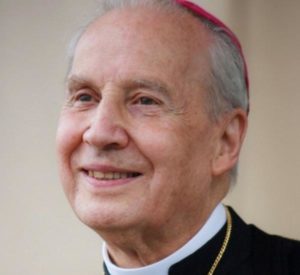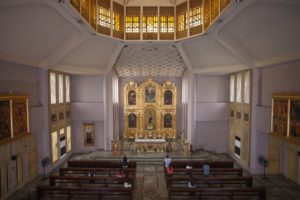Bishop Javier Echevarría ✝, former prelate of Opus Dei, delivered this homily on August 12, 1998 at the Sancta Maria Stella Orientis Oratory.
My brothers and sisters in Christ, it gives me great joy to celebrate this Holy Mass with all of you. I wish it were our Founder himself who were celebrating this Mass, because it was he who prayed the most for this university, many years before it was established. And yet I can also say that he is present here with us. First, through the communion of the saints, he is praying for all of you from heaven. Besides, every corner of this school, and especially the chapel, bears witness to the spirit he gave to all of us by his word and example.
“I tell you solemnly once again, if two of you on earth agree to ask anything at all, it will be granted to you by my Father in heaven. For where two or three meet in my name, I shall be there with them” (Mt 18:19-20). These words of Our Lord found in today’s Gospel became the support for Blessed Josemaria’s apostolic work. He used to say that his faith in God was so solid that one could even slice it. I recall that noche buena with him in 1969, when he gave us insights to meditate on. He read the words of Our Lord regarding the power of prayer. Aside from what we have heard in today’s Gospel according to St. Matthew, he quoted four others. The first was: “And whatever you ask in prayer, you will receive, if you have faith” (Mt 21:22). The other one was from St. Mark: “Therefore I tell you, whatever you ask in prayer, believe that you will receive it, and you will” (Mk 11:24). The third from St. Luke: “For everyone who asks receives, and he who seeks finds, and to him who knocks it will be opened” (Lk 11:10). From St. John’s Gospel he chose these two: “Truly, truly, I say to you, if you ask anything of the Father; he will give it to you in my name” (Jn 16:23); and “Ask, and you will receive, that your joy may be full” (Jn 16:24).
During those years he was praying hard for the final juridical status of Opus Dei. After praying for almost 50 years, it was granted in 1982. He himself did not see it, but he gave us a lesson of perseverance in prayer as the only way to do the Work of God. If you ask me what advice to give you for the University, I have no other advice but what Blessed Josemaria used to tell us: “Opus Dei is the fruit of prayer and it is only by prayer that we will move forward.”
So when you think the problems you face each day are too heavy, go with your heart to the tabernacle. There, you will find consolation. When you are overcome by worry or fear about the future, it only means that your life of prayer needs to grow more. If you want to feel more united with those who work with you, ask Our Lord for more charity. Blessed Josemaria used to say that undertakings like this University do not succeed not because of lack of money, but because of lack of good spirit. And do not forget that a basic point of the spirit of Opus Dei is to give primary importance to prayer and faith in prayer. He would add that the weapon of Opus Dei is not work, but prayer. What we do is convert work into prayer.

It is only through the harmony of academic work and prayer that your actions will be pleasing to God. God has commanded us to love Him with our whole heart, and whole mind, and whole strength (Cf. Deut. 6:4-5). Research work, teaching, maintaining the buildings cannot be seen only as purely professional activities. No, you have to sanctify all that, and find God in your daily work. Life in the University is worth the sacrifice if your activities, in one way or another, lead you and others to God. My children, you cannot work purely for temporal reasons. Our beloved Father wrote in The Way that if life does not have for its end the Glory of God, it would be detestable.
The other lesson we can learn from the life of Blessed Josemaría is the importance of sacrifice. From the early years of Opus Dei, he said that he depended on the “artillery support of many hospitals in Madrid” to get supernatural strength. He asked the sick to offer their pains, their loneliness, for the work he was doing. Up to the last days of his life, he wanted to rely on sacrifices offered with joy as the fulcrum to move the merciful Heart of Jesus.
Apply the same solution for your work in this University. “Nothing becomes a reality without sacrifice,” we read again in The Way. It is clear to all that you have done much. And you have done all that with hard work offered to God. But when you have the faith and the desire to serve the Church and society, then every sacrifice is worthwhile. When Blessed Josemaría was suffering from a very serious case of diabetes for 10 years, he went on working as usual. People did not know that he had severe headaches every day and had sores in his body. They only knew his cheerful smile and fatherly affection. Those 10 years coincided with the expansion of Opus Dei to new countries. God accepted his sufferings and blesses the apostolate of Opus Dei everywhere.
When more sacrifice is asked of you in your work, whether manual or intellectual, look at it as a chance to grow in virtue. A person who complains about his work all the time has not understood the meaning of sacrifice. To be an effective part of this University, you do not have to be a genius; you only need to work hard and work with constancy. Remember that Our Lord rode a poor donkey on his way to Jerusalem. The Founder of Opus Dei liked to draw lessons of humility from that animal. With a touch of good humor he once said: “To me, all donkeys look like professors, with those marvelous ears that look like antennae, and with their lively and alert look. But, besides, they look wise because they are docile, and let themselves be led by others.”

Let us always remember the admonition of Our Lord: only those who imitate His humility will have peace in their hearts even in the midst of their labors and burdens (Cf. Mt 11:28-30).
We shall now continue with the Holy Mass. We entrust ourselves to Our Lady, Stella Orientis (The Star of the East) so that through her intercession, our prayer of thanksgiving may be acceptable to the Lord. May this chapel, which is dedicated to her, be the point of reference for all your work in the University, for the glory of God.#
Leave a Reply